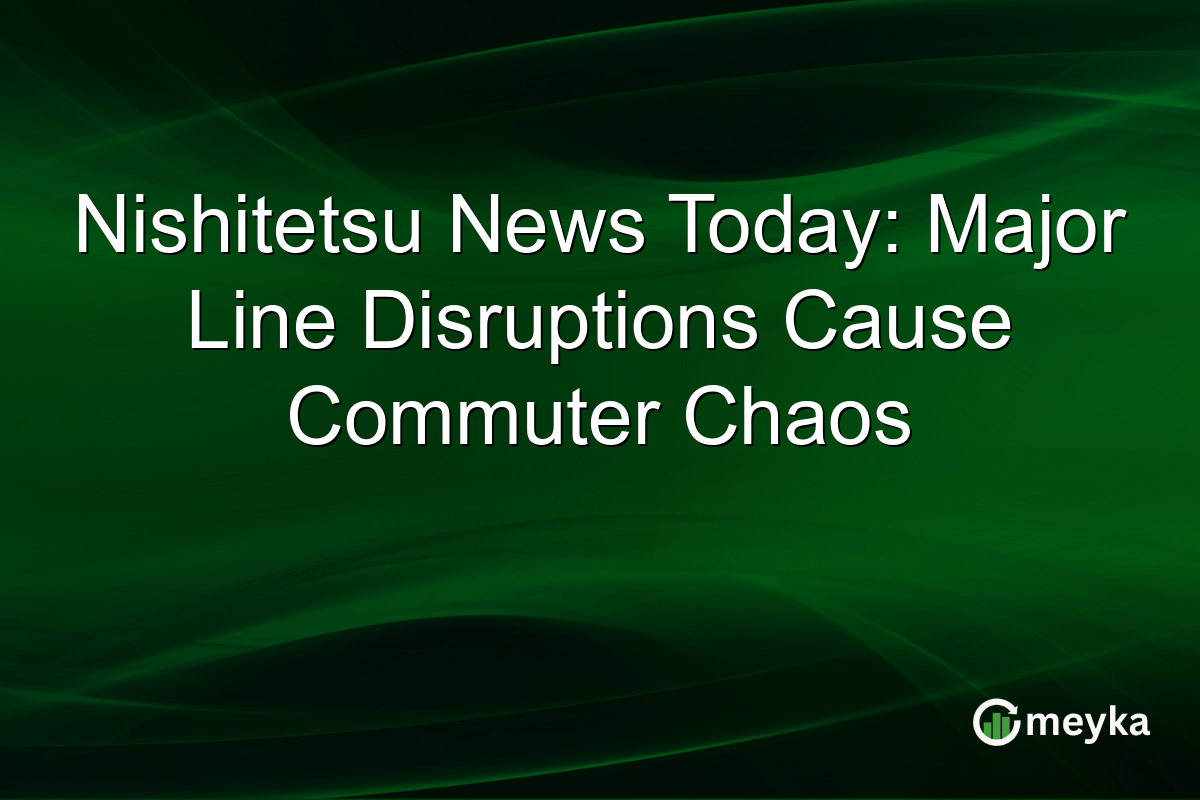Nishitetsu News Today: Major Line Disruptions Cause Commuter Chaos
Today, the Nishi-Nippon Railroad, commonly known as Nishitetsu, found itself in the spotlight due to a significant train disruption on the Tenjin Omuta Line. This unexpected event has affected thousands of commuters in Fukuoka and surrounding areas, leading to extensive delays and operational challenges. As search volumes surge for “Nishitetsu train disruption,” investors and commuters alike wait for potential impacts on Nishitetsu’s future ridership and earnings.
Understanding the Nishitetsu Disruption
On October 3, 2025, the Tenjin Omuta Line, a vital part of Nishitetsu’s network, faced unforeseen disruptions. Train services were halted due to an electrical malfunction, stranding thousands of daily commuters. This disruption is not just a logistical hiccup but potentially affects Nishitetsu’s operational reputation and customer trust. According to CNBC, companies relying on punctuality in transportation may face productivity losses as employees deal with these delays. Looking at broader implications, Japan rail delays aren’t new, but persistence can wear down consumer patience and trust. For a company like Nishitetsu, maintaining a positive public image is crucial to sustaining their competitive edge in Fukuoka’s public transport sector.
Commuter Impact and Response
The disruption on the Tenjin Omuta Line has caused significant challenges for daily commuters. Reports indicate delays extended nearly two hours in some areas, escalating frustrations among passengers dependent on punctual service. An immediate response involved deploying additional buses, yet congestion remained an issue. Nishitetsu’s rapid communication attempts via social media channels aimed to alleviate passenger concerns but met with mixed reactions. This incident highlights the vulnerability of city transport systems and the importance of robust contingency planning. Offering swift resolutions is key to preventing long-term dissatisfaction among users. Reuters noted that improved infrastructure investments would be necessary to avoid such challenges in the future.
Potential Impact on Nishitetsu’s Financials
As Nishitetsu grapples with immediate logistical challenges, long-term implications on their financial health are now a concern. Service disruptions can lead to decreased ridership if alternatives like carpooling or cycling become more appealing. Observers are keenly assessing whether continued disruptions could affect Nishitetsu’s projected earnings. Moreover, investor sentiment is closely tied to operational performance. While short-term impacts may not drastically cut into revenues, repeated issues can dim Nishitetsu’s appeal to stakeholders. Notably, these developments could prompt a review of their operational strategies, ensuring resilience against similar future setbacks. See detailed updates on this unfolding story on Bloomberg.
Final Thoughts
Nishitetsu’s recent train disruption exposes the critical nature of efficient transport systems and their impact on commuters’ daily lives and corporate finances. While prompt responses and transparency are essential for maintaining customer trust, the company must also anticipate and mitigate future risks more effectively. Beyond operational adjustments, this event may call for strategic infrastructure investments to reinforce resilience. Meyka, an AI-driven platform, offers insights into these trends, helping investors forecast potential shifts in Nishitetsu’s financial outlook. As Fukuoka’s commuters navigate these challenges, Nishitetsu’s response could determine user loyalty and economic impact in the long run.
FAQs
The disruption was primarily due to an electrical malfunction on the Tenjin Omuta Line, affecting thousands by interrupting service and causing delays of up to two hours.
Repeated disruptions could lead to decreased ridership and negatively affect investor sentiment, potentially impacting Nishitetsu’s long-term financial performance.
Nishitetsu deployed additional buses and utilized social media for communication to manage commuter frustrations, but congestion and dissatisfaction persisted.
Consistent delays can undermine commuter trust, prompting a shift towards other transport modes, and intensifying calls for infrastructure improvements.
Yes, continued issues might prompt stakeholders to reevaluate the company’s competitive edge, necessitating strategic adjustments to sustain market leadership.
Disclaimer:
This is for information only, not financial advice. Always do your research.






